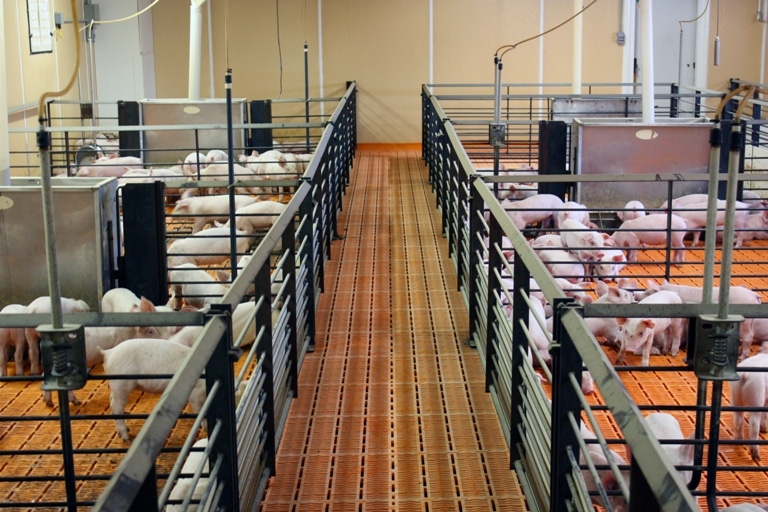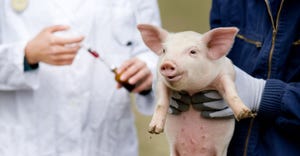Carbadox, a drug hog farmers can’t afford to ditch
Research shows the safety of the product, Phibro fights to keep it on the market

Carbadox, the active ingredient in Phibro Animal Health’s Mecadox, is a drug of choice among U.S. hog producers to safely control bacteria diseases in early growth stages of pigs. Last week, the U.S. Food and Drug Administration took the first steps to take this valuable pharmaceutical away from the swine industry.
Tom Burkgren, DVM and executive director of the American Association of Swine Veterinarians, says it is a very important product and there is no getting around it. The FDA’s action is bad timing for hog producers as the industry adjusts to the new antibiotic use rules that go into effect on Jan. 1, 2017, reducing the available antibiotic options for livestock producers. Burkgren says, “On Jan. 1, we are on the precipice of unprecedented removal and overall change in antibiotics through the FDA.”
Larry Miller, president of Phibro Animal Health, says “nothing is more important to us than providing safe products and we are confident in the safety of Mecadox. We are concerned that the FDA’s direction would unnecessarily limit an already small number of products available for treating and controlling diseases in particular through feed medications. Swine veterinarians and producers need available choice options to manage disease.”
U.S. hog producers have never faced this situation before. In the European Union, the removal of antibiotics used in swine meant major changes in production practices, weaning ages and feed diets to manage the skyrocketing cases of diarrhea diseases in young pigs.
While new rules focus on the antibiotics classified as medically important drugs to humans, carbadox is one of the few antibiotics that fall outside of the new regulations. It is very effective for enteric-disease protection in the critical late-nursery and early growing stages of production, making it popular with hog producers to prevent scours in weaned pigs. Burkgren explains, “It is not a medically important drug to humans. So there is no resistance issue. It is a product that has been used for 40 years successfully.”
Phibro Animal Health markets the antibiotic carbadox by itself as Mecadox Premix 10, and also has two combination approvals from the FDA: Banminth/Mecadox and Mecadox/Terramycin.
Over the years, Burkgren says the use of these products has been really refined and now they are mostly used in the early growing stage of the pig. There is some use in finishing pigs but the 42-day withdrawal period, as stated on the label, is followed.
Unfortunately, there is no ideal substitute for carbadox. Given its effectiveness, the removal of the product from the marketplace could increase the use of other antibiotics.
“U.S. livestock industry cannot afford to lose another medicated feed product from its toolbox, especially when the science points to its safety along with a history of 40 years of safe use. This issue of diminishing of product availability is causing severe damage in animal welfare as well as sustainability in pork production,” Miller states.
Peculiar timing
In the process of reexamining the Mecadox products, the FDA is proposing to rescind the use of carbadox to treat swine because of concerns that the drug may leave trace amounts of a carcinogenic residue and the agency states that Phibro “has failed to provide sufficient scientific data to demonstrate the safety of this drug.”
Interestingly, Phibro believes the FDA jumped the gun on making the announcement. Phibro has already submitted its request for a hearing and has until July 11deadline to submit the scientific data and analysis regarding the safety of Mecadox. The company confirmed it has been engaged in comprehensive safety studies for the past several years to address the FDA’s concerns, and it remains on target to complete the remaining studies to answer the FDA’s questions by that deadline.
According to the FDA, there is a potential risk to human health from consuming pork, especially pork liver, derived from carbadox-treated pigs. Richard Coulter, senior vice president of scientific and regulatory affairs for Phibro Animal Health, says the current research is being conducted with the latest technology to confirm the product’s safety and the results this far have shown no hazardous residues detected in any pig meat – all edible tissues – after the 42-day withdrawal period.
In explaining the reviewing process, Coulter says Phibro does not just look for the safe or good stuff. He says, “We have not only exhaustingly been looking for scientific evidence that supports the safety of the drug but we are also just as aggressively looking for any sign of harmful residues of the drug in any edible tissues of the pig. We have not found any evidence of any hazardous material at all at the 42 day withdrawal period.”
Obviously, Phibro was caught off guard over the FDA’s action. Miller says, “We were disappointed that the FDA took this move without scientific evidence that Mecadox is unsafe when used in accordance with the label directions and indications. The timing of the announcement was disappointing in light of our ongoing and past communications with the FDA. We have been sharing the findings of the studies as they become available and we recently advised the FDA that our studies were on schedule to be completed in June of this year.
“The FDA took this action without regard to the recent studies submitted by Phibro, the study currently in progress and more than 4 decades of safe use of Mecadox. We believe their approach is an extreme application of precautionary principle which is not based on any of the new science.”
For Burkgren, the FDA’s decision has the potential to be a political agenda rather than a scientific one. “If it is a political issue then the science is going to get really railroaded out. We want good science for these types of decisions because they could definitely impact pig health and welfare.”
Word to the hog producer
Mecadox remains an effective product for controlling bacterial diseases including salmonella and swine dysentery. Miller says, “Mecadox is not used in human medicine nor considered medically important, making it a preferred medicine with a 40-year track record of safety. We believe producers can be confident in their decision to keep treating animals with Mecadox.”
Phibro is aggressively fighting to keep the product on the market. After the official FDA notice was issued on April 12, the company had 30 days to request a hearing. Three short days later, Phibro submitted its formal request for hearing, requesting the FDA to review all the scientific data and analysis regarding the safety of Mecadox. The company urges the agency to base the decision on sound science.
“Nothing is more important to Phibro than the safety of its products. I would not be able to sleep at night if we had product on the market that I thought was unsafe,” Miller stresses. “Reality is all scientific evidence to date affirms the product’s safety when used in accordance with the label direction. With that in mind and knowing that it is not used in human medicine and not considered medically important, we believe the responsible thing to do is to urge the FDA to reconsider their decision and base their decision on sound science.”
About the Author(s)
You May Also Like



